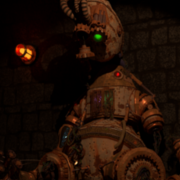Somewhere in Visual Studio there's the well hidden property manager and from there you can find property sheets for your user. That's where I dump all paths to headers and libraries I use a lot (boost, etc.). In some Express versions it's hidden even more behind first having to change to some "expert view".
C++ starter
hey guys i have 1 more question. so i started looking into sfml and i got it all set up then i noticed that people are using openGL with it? so from what i under stand sfml is a set of lib that creates windows and displays stuff and openGL is a graphics engine? im confused of what thies things are and how i would use them. also whould i use directX instead or does it not work with sfml?
hey guys i have 1 more question. so i started looking into sfml and i got it all set up then i noticed that people are using openGL with it? so from what i under stand sfml is a set of lib that creates windows and displays stuff and openGL is a graphics engine? im confused of what thies things are and how i would use them. also whould i use directX instead or does it not work with sfml?
SFML consists of five seperate libraries. You can use only the system and window libraries in case you want to use OpenGL yourself. But if you only want 2D by using the default SFML classes, you should use the graphics library, in this case you don't have to use OpenGL, so don't worry about it.
i feel like u can learn C++ but then u get a engine or some lib and then bam! u know nothing again. because now all the sf::and keywords i don't know and there is not many tut's up to date for this and i don't know how i'm supposed to go through and learn everything on my own. mainly because when i learned c++ it was everything for console stuff and nothing else.
i feel like u can learn C++ but then u get a engine or some lib and then bam! u know nothing again. because now all the sf::and keywords i don't know and there is not many tut's up to date for this and i don't know how i'm supposed to go through and learn everything on my own.
My recommendation for that is once you THINK you know C++, go download a copy of the standard. The draft standard is easy to find, Wikipedia has links at the bottom.
Reading the standard is hard, but that is the actual language. Most people are content to read books about the language or libraries and documentation, but they never spend the effort to know the actual language. They take time to study about the thing, but never study the thing itself.
i feel like u can learn C++ but then u get a engine or some lib and then bam! u know nothing again. because now all the sf::and keywords i don't know and there is not many tut's up to date for this and i don't know how i'm supposed to go through and learn everything on my own.
My recommendation for that is once you THINK you know C++, go download a copy of the standard. The draft standard is easy to find, Wikipedia has links at the bottom.
Reading the standard is hard, but that is the actual language. Most people are content to read books about the language or libraries and documentation, but they never spend the effort to know the actual language. They take time to study about the thing, but never study the thing itself.
i some what understand what you are saying. i have read 2 books on C++ both were C++ for beginners through game programming. and they were all on the standard library. should i keep looking for more basic C++ tut's on console to learn more? or keep trying to learn sfml and make games while i know very little C++. http://www.open-std.org/jtc1/sc22/wg21/docs/papers/2012/n3337.pdf is this what you were talking about?
i have 1 very big question to ask. ok i am only 15 and been so into programming since i was 12 and i know this is what i love. but i am not a very good at teaching my self through books or video but i have tryed so hard and i have learned so much but it never seems like i know enough. like i am always going to be a beginner. so should i just give up and wait till i go to college for game dev and learn there or keep going on like a snail and learning really slowly and feeling like i know nothing all the time?
i have 1 very big question to ask. ok i am only 15 and been so into programming since i was 12 and i know this is what i love. but i am not a very good at teaching my self through books or video but i have tryed so hard and i have learned so much but it never seems like i know enough. like i am always going to be a beginner. so should i just give up and wait till i go to college for game dev and learn there or keep going on like a snail and learning really slowly and feeling like i know nothing all the time?
I've been programming for 20 years now, i still learn new things almost every day and there is a metric crapton of stuff that i still don't know.
Keep your projects small and try to add a few challenges to each project you make, if you havn't made any graphical games yet i'd recommend starting by making a pong clone (it covers the basics without complicating things).
You may allready know enough to solve some problems and you will never know enough to solve all problems, as long as you keep moving forward you will eventually get to a point where you know enough for someone to pay you to write code (and when it comes to learning nothing beats working 40+ hours / week with other professionals)
The voices in my head may not be real, but they have some good ideas!
i have 1 very big question to ask. ok i am only 15 and been so into programming since i was 12 and i know this is what i love. but i am not a very good at teaching my self through books or video but i have tryed so hard and i have learned so much but it never seems like i know enough. like i am always going to be a beginner. so should i just give up and wait till i go to college for game dev and learn there or keep going on like a snail and learning really slowly and feeling like i know nothing all the time?
Well, you're still very young, and to be honest, the basics of programming can sometimes feel a little slow. But once you get out of the earliest stages, I think you'll be surprised at how quickly you can progress. I know when you're starting out and programming console stuff, or pong games, then you look at something like a 2D platformer, it can seem like it's years away. But, it really isn't. Just stick with it, and you'll be making things you can be proud of soon enough.
Also, don't be intimidated by libraries. It's mostly syntax. A tool, if you will (and SFML, like its name implies, is remarkably simple). They often exist solely to make things easier for you. Think of them as shortcuts. It's helpful and probably recommended to learn and understand how and what they're doing under the hood, but at the end of the day, they're there to aid you. For SFML for example, loading and binding an image is just a few lines of code and voila, you now have a background and images on the screen. It would be remarkably more difficult to do the same thing without the library. So, while it seems like you're learning another "language," learning how to use the library is going to be vastly more simple than learning how to do the same things without the library. Also, most of the time, depending on what you're doing, SFML boils down to just a few dozen commands to remember, mostly regarding image/sound loading. And, if you're using a decent IDE with the documentation loaded, you can aid yourself further by just toying with the different prompts that come up, to see what the library offers. Personally, I don't always remember all the syntax for a library. So, it can be handy to have those prompts come up and remind you :P
I found this video series useful when learning SFML. He walks you through all the SFML modules, and all together it includes pretty much everything you'll need to make a 2D game. From loading images, collision detection, sound, the game loop, etc. He's pretty good (most of the time) at explaining what you're doing and why, which is great for tutorials.
It's for 2.0, but to be honest, the changes from 2.0 to 2.1 are pretty easily looked up, and there aren't a whole lot of major syntax changes, so, the examples he uses should almost certainly still compile fine for the most part.
But, don't get discouraged, you're almost past the "unrewarding" part of programming (and by unrewarding, I only mean, what can feel like a lot of work just to have something print out on the console :P).
Beginner here <- please take any opinions with grain of salt








